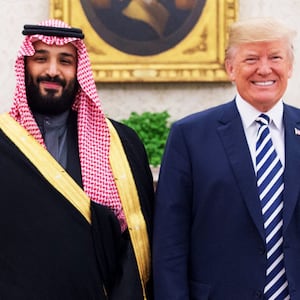In September 2017, authorities in Saudi Arabia had one of the kingdom’s most prominent clerics, Salman al-Awda, thrown in jail without charge over something he didn’t tweet.
A member of al-Awda’s family, who were soon forbidden to travel outside the kingdom, told Human Rights Watch that al-Awda had defied a government order to tweet his support of Saudi Arabia’s blockade of Qatar. Then the Saudis threw al-Awda’s brother Khaled into a cell after Khaled tweeted anger at Salman’s detention.
Responsibility for the al-Awdas’ confinement is no mystery. It was part of a broader government crackdown on those nebulously said to act “against the security of the kingdom and its interests”—a crackdown that led to the infamous November 2017 Ritz-Carlton detention of potential rivals to the new Saudi crown prince: Mohammed bin Salman, who had convinced credulous westerners he was a reformer.
Human Rights Watch’s Sarah Leah Whitson, who exposed al-Awda’s case, was explicit: “Crown Prince Mohammed bin Salman’s efforts to reform the Saudi economy and society are bound to fail if his justice system scorns the rule of law by ordering arbitrary arrests and punishments.”
On Wednesday, the U.S. Department of State released its annual human-rights report for 2018, the first year in which the de facto rule of the man known as MBS was uncontested. The section on Saudi Arabia does not mention al-Awda’s imprisonment. Instead, it wrapped al-Awda’s case within a vague reference to a United Nations panel’s 2018 alarm at a “worrying pattern of widespread and systematic arbitrary arrests and detention,” which explicitly referenced al-Awda.
It’s just one example of the euphemistic way the State Department avoids calling out MBS, even as the report can’t get around highlighting the dismal human-rights record of the kingdom MBS runs.
The most egregious such case concerns what remains MBS’ most infamous act: the October murder, dismemberment, and cover-up of Washington Post columnist Jamal Khashoggi. The CIA swiftly concluded that MBS ordered Khashoggi’s assassination, using a hit team overseen by MBS aide Saud al-Qatani. But the Trump administration, which is aligned with Saudi Arabia generally and MBS particularly, refuses to use the CIA assessment as a reason to sanction MBS in any way, and instead sanctioned those, including al-Qatani, who implemented MBS’ murder scheme.
That’s reflected in the State Department report. It states outright that “[g]overnment agents carried out the killing” in Saudi Arabia’s Istanbul consulate, and that MBS’ dad, the octogenarian King Salman who formally rules the country, pledged accountability. It also flatly stated that “the government or its agents engaged in arbitrary or unlawful killings,” and cited Khashoggi’s slaying as the first listed example.
Yet the report doesn’t mention the CIA’s assessment of MBS’ culpability, let alone attributing Khashoggi’s killing to MBS. Yet it highlights the involvement of Qatani and another MBS affiliate, Gen. Ahmad al-Asiri, while keeping MBS’ name firmly away from the Khashoggi case. The report even finds time to tacitly criticize the prosecutor’s office for not “provid[ing] a detailed explanation of the direction and progress of the investigation.”
Amazingly, the report writes that “in other cases,” not related to Khashoggi, “the government did not punish officials accused of committing human rights abuses, contributing to an environment of impunity.”
There’s only one reference in the entire report to MBS—a citation of a Bloomberg News interview—and it’s far, far away from the Khashoggi section. It arises in a discussion of arbitrary detention and the opacity of determining how many people the Saudi government MBS locked up in 2018 on graft charges. The prosecutor in April said it was 56; MBS told Bloomberg in October it’s eight—and like with Khashoggi, the report doesn’t adjudicate the dispute.
Even though MBS runs Saudi Arabia, he’s a nonentity in a report that extensively documents Saudi torture, repression of political activists, structural misogyny, and a growing crackdown on critics of the monarchy since MBS’ elevation. (In September 2018, prosecutors said they’d seek the death penalty for al-Awda.)
It refers to a consolidation of the Saudi security apparatus “directly to the king” without mentioning that the consolidation occurred in the context of King Salman elevating his son to what an observer with the Arab Gulf States Institute in Washington called a “near monopoly of power in the hands of MbS.” When the State Department report mentions the Ritz-Carlton detention of “princes, businessmen and former and current government officials,” expressly carried out by and for the benefit of MBS, it doesn’t say a word about its architect.
That appears to reflect the prerogatives of Secretary of State Mike Pompeo, who was photographed beaming in Riyadh beside MBS when dispatched to discuss Khashoggi. Pompeo, a former CIA director, has refused to say if he believes the CIA’s assessment of MBS culpability for the murder and bristled when asked about it. “We also know that we have an important relationship with the Kingdom of Saudi Arabia, and we’re determined to make that a successful relationship,” Pompeo said in February.
And it’s not just Pompeo: President Trump’s son-in-law Jared Kushner paid MBS a visit just last month. For them and for the State Department report, responsibility for Khashoggi’s murder belongs at levels far below the crown prince who allegedly said he had “a bullet” for the troublesome journalist.









